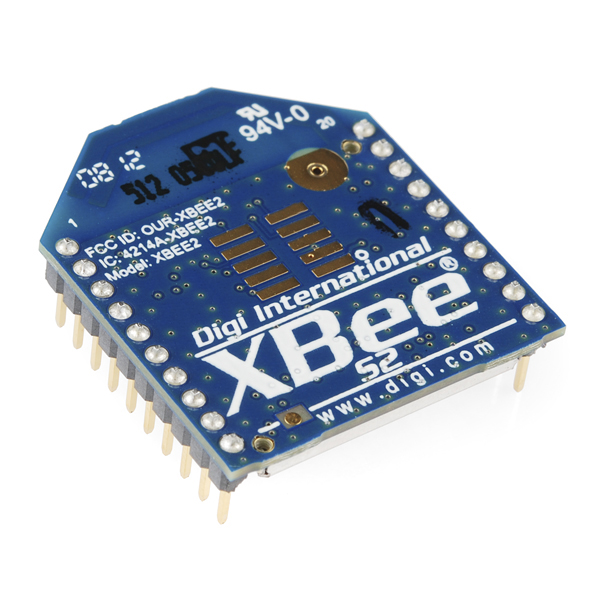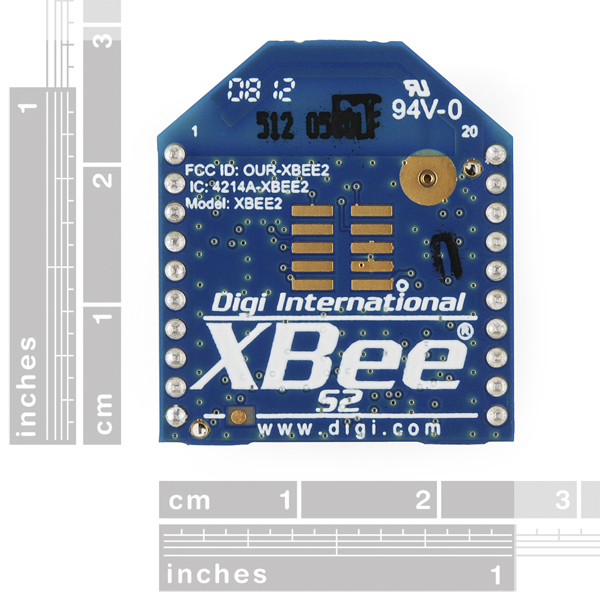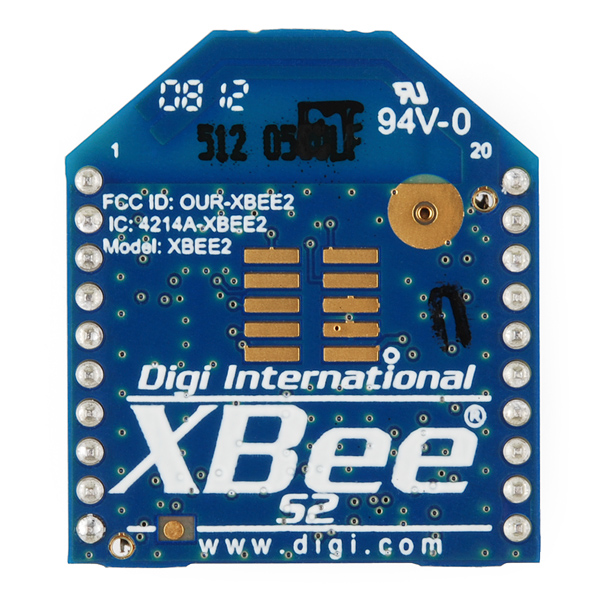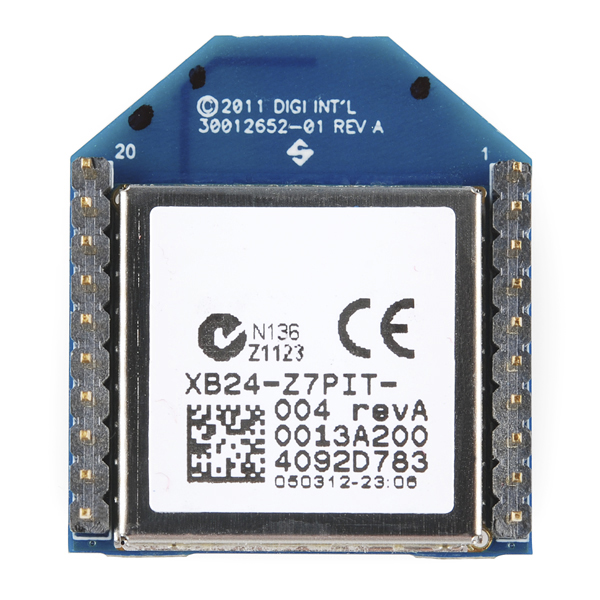XBee 2mW PCB Antenna - Series 2 (ZigBee Mesh)
This is the XBee XB24-Z7CIT-004 module from Digi. Series 2 improves on the power output and data protocol. Series 2 modules allow you to create complex mesh networks based on the XBee ZB ZigBee mesh firmware. These modules allow a very reliable and simple communication between microcontrollers, computers, systems, really anything with a serial port! Point to point and multi-point networks are supported.
These are essentially the same hardware as the older Series 2.5, but have updated firmware. They will work with Series 2.5 modules if you update the firmware through X-CTU.
Not sure which XBee module or accessory is right for you? Check out our XBee Buying Guide!
Note: If you are looking for a simple point-to-point configuration, you might want to try the Series 1 instead. The Series 2 requires considerable setup and configuration. We highly recommend Building Wireless Sensor Networks as a guide for setting up mesh networks.
Note: Series 1 and Series 2 XBee modules have the same pin-out. However, Series 1 modules cannot communicate with Series 2 modules.
Note: If you are using these outside of the United States, please check with your local laws regarding radio communication.
- 3.3V @ 40mA
- 250kbps Max data rate
- 2mW output (+3dBm)
- 400ft (120m) range
- Built-in antenna
- Fully FCC certified
- 6 10-bit ADC input pins
- 8 digital IO pins
- 128-bit encryption
- Local or over-air configuration
- AT or API command set
XBee 2mW PCB Antenna - Series 2 (ZigBee Mesh) Product Help and Resources
Core Skill: Programming
If a board needs code or communicates somehow, you're going to need to know how to program or interface with it. The programming skill is all about communication and code.
Skill Level: Competent - The toolchain for programming is a bit more complex and will examples may not be explicitly provided for you. You will be required to have a fundamental knowledge of programming and be required to provide your own code. You may need to modify existing libraries or code to work with your specific hardware. Sensor and hardware interfaces will be SPI or I2C.
See all skill levels
Core Skill: Electrical Prototyping
If it requires power, you need to know how much, what all the pins do, and how to hook it up. You may need to reference datasheets, schematics, and know the ins and outs of electronics.
Skill Level: Noob - You don't need to reference a datasheet, but you will need to know basic power requirements.
See all skill levels
Comments
Looking for answers to technical questions?
We welcome your comments and suggestions below. However, if you are looking for solutions to technical questions please see our Technical Assistance page.
Customer Reviews
5 out of 5
Based on 1 ratings:
Fantastic
These modules are terrific. Once you've mastered setting them up, linking them together allows one to create great projects. I've needed support in the past...it wasn't the Xbee's fault...and I can honestly say that I've never had such dogged wonderful assistance with such extremely experienced personnel, who stuck with me over the course of a month! The same person would call, email and do experiments on their end to work out what the problems were on mine. These devices work flawlessly and are really robust units. You won't go wrong with these.





the XCTU software does not list DIO8 or DIO9, how can I configure these as digital inputs?? I only see DIO0-DIO5 and DIO10-DIO12 on the config list. Then DIO6-DIO7 are hidden in a different list. I have checked every single config option, no DIO8 or DIO9 in sight.... Has anyone used a zigbee with all digital/analog inputs enabled?? Help!
Suggest everyone look at other solutions for ZigBee support. Digi's advertising materials say that the Series 2 devices all are "ready to support the HA profile" and only the SMT model has what it takes to support the HA profile. The S2B devices lack the functionality to support it properly, per ALL of the comments from the Digi community veterans and the observed behaviors from my purchased devices. It will work as a network of devices in "Pro" Mesh mode, so it's not a dead loss for me- just not happy about Digi basically fibbing about the product's capabilities in a manner that constitutes a deceptive business practice.
The description says XB24-Z7CIT-004, but the photo says XB24-Z7PIT-004. The one I have in my hand (ordered via SparkFun) also says XB24-Z7PIT-004. What's the difference? Was the CIT an older version?
Yes, the CIT was an older version.
I recently purchased three of these and I cannot get X-CTU to recognize them. I have tried it on two separate Windows XP machines, with the same result. When a device is plugged in to USB via an XBee Explorer, I get a red LED lit up on the Explorer board. When I start X-CTU, it shows up in the Select Com Port box as "USB Serial Port (COM4). However, when I hit the "Test / Query" button, I receive an "Info" window which states that it is unable to communicate with the modem. I have tried it with every available Baud rate and with "Enable API" on, to no avail. This is the same for all 3 XBee's and the 2 XBee Explorer boards that I purchased from SparkFun.
Please help. I'd really like to play with these devices. Thanks.
I had the same problem. I tried two versions of XCTU (5.x and 6.x) on two different computers. Also, same problem with two different XB24-Z7PIT-004 xbees. In the recent past I've used XCTU successfully on several other xbees. On about the 20th try it worked -- I don't know why.
By the way, I did install the FTDI drivers for Windows XP. These show up in Device Manager as the drivers for the COM port mentioned above.
Help me please! I'm trying to make wireless connection between 2 these Xbee in AT mode. Data of router recieved but not at time. They had delay sometime (3-10 second). In delay time both Xbee has RSSI led light up. what should I do?Both Xbee connect with arduino Uno via Lilypad Xbee explorer.
Thanks CowboyBob for answer.
Nothing To do! even if I set JN=0 and i lower the IR paramater as you suggested, nothing changes! So I decided to try a pin Hibernate configuration (SM=1) but still I receive random packets at coordinator with no reason not only when DTR goes low on the End device . What I'm missing ? Does anyone tested the pin hibernate config on xbeeS2 before ? Why I get RF data not only when the end device wakes up from sleep? Is a problem with my settings ,firmware or hw . Please an help!
How much do these weigh?
Dear Sparkfun, Hi bought 2 of these devices some months ago. I'm facing some problems with these device since I cant have them working. I think it's not my problem since i read all datasheet and all "Building Wireless Sensor Networks" book to make my project. This is my problem and my configuration :
End device API version 29A7: SM=5 (cycle sleep with pin wake ) , SP=7D0(20 sec),SN=3,SO=4 (extended sleep for SPxSN sec ,ST=1f4(500msec),IR=3e8(1sec since i want to send just 1 packet).
Coordinator API version 21A7: SP=7d0(20sec) SN =3 .
From what I expected, i have to receive in my coordinator (after the end device joins to the PAN) just one packet for SPxSN sec (1 min) but the problem is that I receive 6 packets every about 40 sec without any reason.
I also changed SN=6 to extend to 2min the cycle sleep but nothing to do. It still sends 6 packets rather than 1. This is strange behaviour and I dont understand what happens at all in the end device.
I think that i'm not wrong in setting AT parameters to both devices since as I mentioned I studied everithings (datasheet, books) about them. Any help will be appreciated .
If you're doing I/O sampling, lower the value of your IR setting. Also make sure that some of those extra packets aren't join notifications by setting JN=0. I have noticed that whatever Xbee uses as a clock is fast. If I use math to figure out a 1 hour sleep cycle, it usually runs about 45 minutes in real life scenarios.
Anyone know what the diff is between this and the S2B? Digi's site and specs they seemed very close but not exact (but not enough in my mind to justify a whole new model number LoL) I know this can do transparent and API... is programmability the only REAL diff w.r.t. S2B?
Hello Sparkfun What is the reference XB24-Z7PIT-004 or XB24-Z7CIT-004?
Looks like these ones are XB24-Z7PIT-004 - that's what the latest shipment I have here is. The previous chip antenna ones were XB24-Z7CIT-004